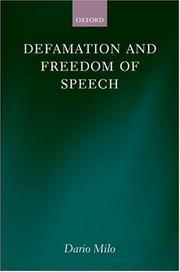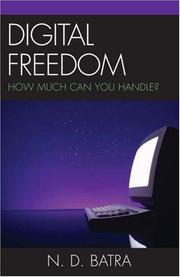| Listing 1 - 10 of 18 | << page >> |
Sort by
|
Book
ISBN: 9780754671244 0754671240 Year: 2008 Publisher: Aldershot: Ashgate,
Abstract | Keywords | Export | Availability | Bookmark
 Loading...
Loading...Choose an application
- Reference Manager
- EndNote
- RefWorks (Direct export to RefWorks)
Using Robert Post's seminal article 'The Social Foundations of Reputation and the Constitution' as a starting point, this book argues that the concept of reputation changes historically, reflecting social, political, economic, cultural and technological changes. It also suggests that the value of a good reputation is not immutable and analyses the history and doctrines of defamation law in the US and the UK. Concepts of defamation law are illustrated via case studies from recent Australian defamation law which give general insight into the nature of particular concepts of reputation. Leading on from the case studies and drawing on approaches to celebrity in media and cultural studies, the author conceptualises reputation as a media construct and demonstrates that reputation as celebrity is of great contemporary relevance at this point in the history of defamation law.

ISBN: 0199204926 9780199204922 Year: 2008 Publisher: Oxford: Oxford university press,
Abstract | Keywords | Export | Availability | Bookmark
 Loading...
Loading...Choose an application
- Reference Manager
- EndNote
- RefWorks (Direct export to RefWorks)
The law of defamation contemplates the clash of two fundamental rights: the right to freedom of expression and the right to reputation. The rules of defamation law are designed to mediate between these two rights. The central proposition that this book makes is that defamation law needs to be reformed to balance the conflicting rights. This discussion flows from a theoretical analysis of the rights in issue; the value underlying the right to reputation that has most resonance is human dignity, while the value that is most apposite to freedom of expression in this context is the argument that free speech is integral to democracy. The argument from democracy emphasizes that speech on matters of public interest should receive greater protection than private speech. This book argues that fundamental rules of defamation law need to be reformed to take into account the dual importance of public interest speech on the one hand, and the right to human dignity on the other. In particular, the presumptions that defamatory allegations are false and have caused damage, the principle of strict liability to primary publishers and negligence liability to secondary publishers, and the availability of punitive damages, should not survive constitutional scrutiny. The quantum of damages and costs rules, and the remedies available in defamation cases, should also be reformed to reflect the importance of dignity to the claimant, and the free speech interest of the public in receiving accurate information on matters of public interest.
Freedom of expression. --- Libel and slander. --- Privacy, Right of. --- Libel and slander --- Freedom of expression --- Privacy, Right of
Book
ISBN: 9783406570490 Year: 2008 Publisher: München Beck
Abstract | Keywords | Export | Availability | Bookmark
 Loading...
Loading...Choose an application
- Reference Manager
- EndNote
- RefWorks (Direct export to RefWorks)
Actions and defenses --- Freedom of expression --- Intangible property --- Libel and slander --- Personality (Law) --- Privacy, Right of --- Calumny --- Defamation --- Slander --- Torts --- Incorporeal property --- Intangible assets --- Intangibles --- Property --- Expression, Freedom of --- Free expression --- Liberty of expression --- Civil rights --- Law and legislation
Book
ISBN: 9789013048803 Year: 2008 Publisher: Deventer Kluwer
Abstract | Keywords | Export | Availability | Bookmark
 Loading...
Loading...Choose an application
- Reference Manager
- EndNote
- RefWorks (Direct export to RefWorks)
Blasphemy --- Hate speech --- Libel and slander --- Pornography --- Literature, Immoral --- Porn --- Porno --- Sex-oriented businesses --- Erotica --- Calumny --- Defamation --- Slander --- Torts --- Defamation against groups --- Group defamation --- Group libel --- Racist speech --- Speech, Hate --- Freedom of speech --- Offenses against religion --- Criminal provisions --- Law and legislation --- Human rights --- Criminal law. Criminal procedure --- Netherlands --- Sex industry
Book
ISBN: 9780191709449 0191709441 Year: 2008 Publisher: Oxford : Oxford University Press,
Abstract | Keywords | Export | Availability | Bookmark
 Loading...
Loading...Choose an application
- Reference Manager
- EndNote
- RefWorks (Direct export to RefWorks)
This text examines the law of defamation, and argues that it must be reformed in a number of ways in order to balance two important constitutional rights, the right to reputation and the right to freedom of expression.
Libel and slander. --- Freedom of speech. --- Freedom of the press. --- Hate speech. --- Libel and slander --- Freedom of speech --- Freedom of the press --- Hate speech --- Law - Non-U.S. --- Law, Politics & Government --- Law, General & Comparative --- Law - Great Britain --- Defamation against groups --- Group defamation --- Group libel --- Racist speech --- Speech, Hate --- Censorship of the press --- Liberty of the press --- Press --- Press censorship --- Censorship --- Freedom of expression --- Government and the press --- Free speech --- Liberty of speech --- Speech, Freedom of --- Civil rights --- Assembly, Right of --- Freedom of information --- Intellectual freedom --- Calumny --- Defamation --- Slander --- Torts --- Law and legislation
Book
ISBN: 9783719027872 Year: 2008 Volume: 91 Publisher: Basel Helbing und Lichtenhahn
Abstract | Keywords | Export | Availability | Bookmark
 Loading...
Loading...Choose an application
- Reference Manager
- EndNote
- RefWorks (Direct export to RefWorks)
342.7 --- Grondwettelijke rechten en vrijheden. Fundamentele rechten --- 342.7 Grondwettelijke rechten en vrijheden. Fundamentele rechten --- Privacy, Right of --- Publicity (Law) --- Law --- Invasion of privacy --- Right of privacy --- Civil rights --- Libel and slander --- Personality (Law) --- Press law --- Computer crimes --- Confidential communications --- Data protection --- Right to be forgotten --- Secrecy --- Criminal provisions --- Law and legislation --- E-books
Book
ISBN: 1921536276 1921536268 9781921536274 9781921536267 Year: 2008 Publisher: Canberra, Australia : ANU E Press,
Abstract | Keywords | Export | Availability | Bookmark
 Loading...
Loading...Choose an application
- Reference Manager
- EndNote
- RefWorks (Direct export to RefWorks)
Blasphemy and other forms of blatant disrespect to religious beliefs have the capacity to create significant civil and even international unrest. Consequently, the sacrosanctity of religious dogmas and beliefs, stringent laws of repression and codes of moral and ethical propriety have compelled artists to live and create with occupational hazards like uncertain audience response, self-censorship and accusations of deliberate misinterpretation of cultural production looming over their heads. Yet, in recent years, issues surrounding the rights of minority cultures to recognition and respect have raised new questions about the contemporariness of the construct of blasphemy and sacrilege. Controversies over the aesthetic representation of the sacred, the exhibition of the sacred as art, and the public display of sacrilegious or blasphemous works have given rise to heated debates and have invited us to reflect on binaries like artistic and religious sensibilities, tolerance and philistinism, the sacred and the profane, deification and vilification. Endeavouring to move beyond ‘simplistic’ points about the rights to freedom of expression and sacrosanctity, this collection explores how differences between conceptions of the sacred can be negotiated. It recognises that blasphemy may be justified as a form of political criticism, as well as a sincere expression of spirituality. But it also recognises that within a pluralistic society, blasphemy in the arts can do an enormous amount of harm, as it may also impair relations within and between societies. This collection evolved out a two-day conference called ‘Negotiating the Sacred: Blasphemy and Sacrilege in the Arts’ held at the Centre for Cross Cultural Research at The Australian National University in November 2005. This is the second volume in a series of five conferences and edited collections on the theme ‘Negotiating the Sacred’. The first conference, ‘Negotiating the Sacred: Blasphemy and Sacrilege in a Multicultural Society’ was held at The Australian National University’s Centre for Cross-Cultural Research in 2004, and published as an edited collection by ANU E Press in 2006. Other conferences in the series have included Religion, Medicine and the Body (ANU, 2006), Tolerance, Education and the Curriculum (ANU, 2007), and Governing the Family (Monash University, 2008). Together, the series represents a major contribution to ongoing debates on the political demands arising from religious pluralism in multicultural societies.
Art, Architecture & Applied Arts --- Fine Arts - General --- Arts and religion. --- Offenses against religion. --- Blasphemy. --- Crimes against religion --- Offenses, Religious --- Religious crimes --- Religious offenses --- Arts --- Religion and the arts --- Religious aspects --- Freedom of speech --- Libel and slander --- Offenses against religion --- Crime --- Religion --- Sacrilege. --- Church desecration --- Desecration --- Host desecration accusation --- Taboo

ISBN: 9780742555747 9780742555730 0742555747 0742555739 0742577023 9780742577022 Year: 2008 Publisher: Lanham Rowman & Littlefield
Abstract | Keywords | Export | Availability | Bookmark
 Loading...
Loading...Choose an application
- Reference Manager
- EndNote
- RefWorks (Direct export to RefWorks)
In Digital Freedom, N. D. Batra explores the tension between the boundlessness of the Internet and the boundaries of the marketplace, as well as the resulting impact on human expression, privacy, and social controls. Batra's thought-provoking book looks at these issues_including surveillance, intellectual property, and copyright_from the perspective of an evolutionary, self-organizing social system. This system both creates and assimilates innovations and, in the process, undergoes reorganization and renewal. Above all, Digital Freedom is an exploration of and meditation on the question: How m
Internet --- Liberty. --- Privacy, Right of. --- Liberté --- Droit à la vie privée --- Social aspects. --- Aspect social --- Liberté --- Droit à la vie privée --- Invasion of privacy --- Privacy, Right of --- Right of privacy --- Civil liberty --- Emancipation --- Freedom --- Liberation --- Personal liberty --- Law and legislation --- Civil rights --- Libel and slander --- Personality (Law) --- Press law --- Computer crimes --- Confidential communications --- Data protection --- Right to be forgotten --- Secrecy --- Democracy --- Natural law --- Political science --- Equality --- Libertarianism --- Social control

ISBN: 1281137367 9786611137366 140206652X 1402066511 9048176905 Year: 2008 Publisher: [Dordrecht] : Springer,
Abstract | Keywords | Export | Availability | Bookmark
 Loading...
Loading...Choose an application
- Reference Manager
- EndNote
- RefWorks (Direct export to RefWorks)
The non-interference perspective is common when theorizing about the protection of the private life of individuals and their families. However, this accepted way of looking at things, leads our thoughts astray. It fails to do justice to the interests both in being left in peace but at the same time participating in a community together with other people. New methods of communications interception, video and even satellite surveillance allow insight and an entry into personal matters, but they can also be used to satisfy people's need for protection, safety and security in public places. A theory about the respect for the individual's right to a private sphere and its protection ought therefore to incorporate both these interests. In The Private Sphere it is suggested that an emotional territory, which forms the individual's own sphere of action and experience, has developed in the course of evolution in pace with the individual's conditions of life, brought about by challenges in the natural and social environment. The starting point is the insight that the behaviour of human beings with respect to their privacy reflects in a fundamental way patterns of behaviour among social animals. The emotional territory allows a readiness to act along different lines and to maintain a multiplicity of different social relations.
Communication --- Privacy, Right of. --- Psychological aspects. --- Invasion of privacy --- Privacy, Right of --- Right of privacy --- Civil rights --- Libel and slander --- Personality (Law) --- Press law --- Computer crimes --- Confidential communications --- Data protection --- Right to be forgotten --- Secrecy --- Interpersonal relations --- Law and legislation --- Ethics. --- Philosophy of law. --- Biology-Philosophy. --- Philosophy of Law. --- Philosophy of Biology. --- Deontology --- Ethics, Primitive --- Ethology --- Moral philosophy --- Morality --- Morals --- Philosophy, Moral --- Science, Moral --- Philosophy --- Values --- Political science. --- Biology—Philosophy. --- Administration --- Civil government --- Commonwealth, The --- Government --- Political theory --- Political thought --- Politics --- Science, Political --- Social sciences --- State, The --- Law --- Biology --- Moral Philosophy and Applied Ethics. --- Philosophy. --- Vitalism --- Jurisprudence

ISBN: 0415443245 0203927702 9780414443234 9780415443241 9780203927700 9780415443234 9781134068319 9781134068357 9781134068364 Year: 2008 Publisher: Londen Routledge
Abstract | Keywords | Export | Availability | Bookmark
 Loading...
Loading...Choose an application
- Reference Manager
- EndNote
- RefWorks (Direct export to RefWorks)
This book offers the first comprehensive and critical investigation of the specific modes of risk calculation that are emerging in the so-called War on Terror.Risk and the War on Terror offers an interdisciplinary set of contributions which debate and analyze both the empirical manifestations of risk in the War on Terror and their theoretical implications. From border controls and biometrics to financial targeting and policing practice, the imperative to deploy public and private data in order to ‘connect the dots’ of terrorism risk raises important questions for social scientists and practitioners alike.How are risk technologies redeployed from commercial, environmental and policing domains to the domain of the War on Terror?How can the invocation of risk in the War on Terror be understood conceptually?Do these moves embody transformations from sovereignty to governmentality; from discipline to risk; from geopolitics to biopolitics?What are the implications of such moves for the populations that come to be designated as ‘risky’ or ‘at risk’?Where are the gaps, ambiguities and potential resistances to these practices?In contrast with previous historical moments of risk measurement, governing by risk in the War on Terror has taken on a distinctive orientation to an uncertain future. This book will be of strong interest to students and researchers of international studies, political science, geography, legal studies, criminology and sociology.
Terrorism --- Privacy, Right of --- Ports of entry --- Prevention --- Risk assessment --- Security measures --- Terrorism risk assessment --- Privacy, Right of. --- 811 Filosofie --- 852 Internationale conflicten --- Invasion of privacy --- Right of privacy --- Civil rights --- Libel and slander --- Personality (Law) --- Press law --- Computer crimes --- Confidential communications --- Data protection --- Right to be forgotten --- Secrecy --- Anti-terrorism --- Antiterrorism --- Counter-terrorism --- Counterterrorism --- Prevention. --- Law and legislation --- Acts of terrorism --- Attacks, Terrorist --- Global terrorism --- International terrorism --- Political terrorism --- Terror attacks --- Terrorist acts --- Terrorist attacks --- World terrorism --- Direct action --- Insurgency --- Political crimes and offenses --- Subversive activities --- Political violence --- Terror --- Terrorism - United States - Prevention --- Terrorism - Risk assessment - United States --- Privacy, Right of - United States --- Ports of entry - Security measures - United States --- Terrorism - Prevention
| Listing 1 - 10 of 18 | << page >> |
Sort by
|

 Search
Search Feedback
Feedback About UniCat
About UniCat  Help
Help News
News